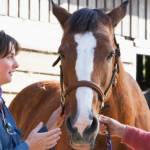Vaccinating Horses Against Leptospirosis

While not considered a core vaccine by the American Association of Equine Practitioners, vaccination against leptospirosis could benefit many horses, and omega-3 fatty acids can help a horse’s immune system respond maximally to such a vaccine.
“Leptospirosis is a bacterial disease capable of causing multiple problems, including kidney damage, reproductive losses such as early embryonic death and stillbirths, as well as equine recurrent uveitis or moon blindness,” explained Kathleen Crandell, Ph.D., of Kentucky Equine Research (KER).
In 2015, the first equine-specific vaccine for leptospirosis was introduced to the market. According to a recent study on leptospirosis in horses*, owners continue to doubt the safety and efficacy of certain equine vaccines for various reasons, including presumed lack of efficacy and safety.
In terms of efficacy, one group of equine researchers* recently demonstrated that a commercially available vaccine for leptospirosis does indeed protect horses against infection. To do so, 54 mares, aged 2 to 6 years and of various breeds were included. Of these, 36 had previously been vaccinated and 18 were unvaccinated.
Two doses of a commercial equine leptospirosis vaccine were administered on day 0 of the study and again on day 40 according to the manufacturer’s instructions. Blood samples were collected from all horses on days 0, 30, and 90, and a “growth inhibition test” was performed to assess response to vaccination (i.e., the inhibitory effect of the anti-leptospira antibodies presumably induced by vaccination).
Vaccination resulted in the production of antibodies against leptospira bacteria in horses, regardless of whether they had or had not been previously vaccinated.
“As mentioned above, administration of omega-3 fatty acids, especially those derived from fish oil that contain DHA and EPA, like, EO•3. Recall that one study demonstrated that horses supplemented diets supplemented with fatty acids had an elevated response to vaccination than horses fed diets only meeting basic nutrition recommendations,” added Crandell.
*Correia, L., G. Martins, W. Lilenbaum. 2017. Detection of anti-Leptospira inhibitory antibodies in horses after vaccination. Microbial Pathogenesis. 110:494-496.








